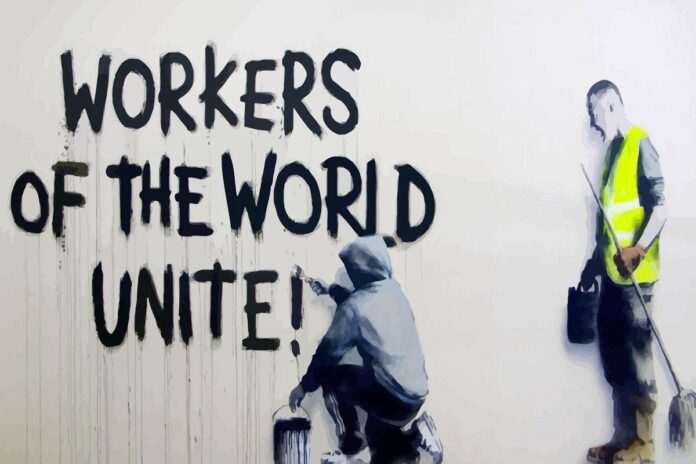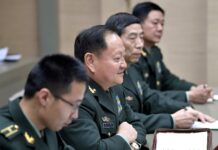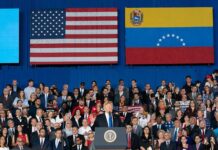Labour movement must oppose militarism and imperialism
Andy Moxley, ISA International Political Committee
(This article was first published on 13 March 2025)
The surge of the right-wing internationally and the shift driven by the ruling class into an epoch of nationalism, militarism and authoritarianism represents an historic danger to the working class. While bearing some similarities with the period that resulted in the rise of fascism in the 1930s, the ruling class is not reacting to the threat of socialist revolutions which threaten the system’s survival, as it was in that time. Moreover, even if some individual capitalists may dream of it, they do not have the ability to completely smash and atomize the workers’ movement.
Nonetheless, the capitalist class do see the need to remove, or at least neutralize potential barriers to their ability to pursue their new global agenda. This is reflected in a widespread authoritarian turn. Among other things, this means mounting attacks on the working class and trade unions, in the form of increased repression.
However, another arm of this strategy is concerted attempts to win the leadership of the workers’ organizations, or parts of it, to their imperialist agenda. This can be done with the stick — by aggressive nationalist pressure to get in line — or even with the carrot, by offering perceived concessions or benefits to sections of workers. This represents a grievous threat to the unity and integrity of the labour movement internationally. What can we do to combat it?
The myth of common national interests
Despite starting from a historical low point, the past few years have seen a generalized increase in activity in the workers’ movement. This has included strike waves in the US and UK; general or significant mass political strikes in Europe, Asia, Africa and Latin America; realignments within some major workers organizations; and working class methods playing more of a role in struggles in general. In response, the ruling class in several countries has stepped up repression of the unions — using the power of the state to forcibly end strikes, take or threaten to take unions into forced administration, restrict the ability to join a union or conduct outright physical repression.
In India, the Labour Codes originally passed in 2020 by the BJP but likely to be implemented this year will, alongside a number of pro-business reforms affecting working conditions, make it harder to join a union, put new restrictions on strikes and implement punishment against trade union members and leaders who disobey. In late 2024, the Australian Labor-led government took the unprecedented move of taking the militant Construction, Forestry and Maritime Employees Union (CFMEU) construction division into state administration based on allegations of corruption, without any actual legal proceedings having taken place. Similarly, the South Korean state under disgraced former President Yoon repeatedly attacked unions, including with force, over a series of years as a precursor to his attempted dictatorial power grab, amid allegations of union infiltration by North Korea. In Argentina, the trade unions have been key targets of attack for mini-Trump Javier Milei, notably in 2024’s ‘Omnibus Bill’.
However, ISA pointed out in the World Perspectives document passed at our 2024 World Congress, that the increase in workers’ activity has also “been weakened in their power by the role of the trade union bureaucracy” aka the official leadership of the trade union movement.
In an increasing number of cases, this ‘weakness’ is becoming outright undermining of independent working class interests, supporting the reactionary policy choices of their own national ruling classes. This can be seen for instance in the response among some US and Canadian trade union leaders to Donald Trump’s tariffs in the developing global trade wars, backing their respective national capitalists under the illusion that they are somehow beneficial to workers they represent.
A statement from the United Autoworkers (UAW) union in the US on 4 March stated “We are glad to see an American president take aggressive action on ending the free trade disaster that has dropped like a bomb on the working class”. UAW’s supposedly left-wing leader Sean Fain has now repeatedly pledged to ‘work with Trump’. Many Canadian union leaders have mimicked the same. In a 4 March statement from Bea Bruske, head of the Canadian Labour Congress, it appeals to the Canadian government that “We must protect Canadian jobs and industries through retaliation and investments in our future” (emphasis our own).
Unfortunately for them, it’s not that simple on either side of the border. For example, despite pining for the past, US auto manufacturing has been a continent-wide operation since the mid-1960s and it has relied on this relationship since. And while of course, globalization and free trade certainly saw a massive amount of production moved outside of the US in the chase for super-profits by capitalism, even more jobs were destroyed by various moves to increase the rate of exploitation and introduce more automation into the industry.
Moreover, though some industries can certainly be ‘reshored’ to an extent or further developed in the imperialist countries themselves, imperialism remains as Lenin outlined it over a century ago. That is, reliant on the ability to exact ‘superprofits’ from neocolonial super-exploitation, based on even greater exploitation than can generally be achieved in the capitalists’ home country.
But even if the auto industry were reshored to the US, this would not curb its main problem — competition with ascendant Chinese auto production. While the US certainly has a larger potential domestic market to buoy itself than somewhere like Germany, it already faces very little competition from Chinese cars domestically. The core issue is that it still cannot compete on the world stage with the cheaper Chinese cars including EVs. Moves like putting tariffs on Mexico can also advance Chinese interests. The US can be hit, as we have seen, with retaliatory tariffs on its own auto exports. The Smoot-Hawley Tariff Act of 1930 which sparked a trade war which was devastating to the world economy, is a cautionary tale for US capitalism on this front.
National unity in ‘defense’
But it goes beyond just economic policy. The drive towards increased militarism has shamefully been cheered on by some trade union leaders globally as well, as long as it creates more domestic, union jobs. In the UK, Unite the Union General Secretary Sharon Graham has not only welcomed the pledged government increase in defense spending to 2.5% of GDP but has gone further to advocate government investment in the production of new advanced fighter programs, helicopters and military satellites with the caveat that they all must be made in the UK. This is at a time when the Labour government is announcing potentially billions in cuts to social welfare and other government departments and programs.
IndustriALL Europe, a federation of European industrial unions, has fared little better. While opposing associated austerity in words, and drawing attention to the economic consequences of the decline of European capitalism on the working class, they have nonetheless backed the call for increased European military expenditure. In a 4 March statement in response to the announcement of the €800 billion EU project called ‘Rearm Europe’, their criticism amounted only to the desire for “an EU defence industrial policy which invests in workers and ensures good quality industrial jobs for all, while stressing the need to end armed conflict worldwide”.
Clearly increases in arms manufacturing could create jobs in the short-term. And in Germany, the idea of retooling its declining car plants into production centers for war-related industry is already clearly being eyed by a section of the bourgeois. However, we must ask to what end?
The last sentence of the IndustriALL statement advocating to “end armed conflict” is quite paradoxical, given that the thrust of its position is endorsing European imperialism’s rush to catch-up to the other ‘big boys’ (US, Russia and China) in the fight for global imperialist supremacy. It stands for furthering the arms industry but then abstractly calls for an end to its main product — war. It also underlines the fundamental contradiction in the wrong policy of all the above-mentioned union leaders — the myth that there is some sort of common national interest (or regional in the EU’s case) between the capitalists and the working class. This myth is dangerous and in times of war, it is the working class that will pay in blood for the failure to challenge it.
Lessons from the past
This is not a new phenomenon. The workers’ movement has been plagued by leaders who have echoed the capitalists under the guise of ‘protecting’ the workers of their own country. The most notable example of this in history is the majority of the leadership of the Second ‘Socialist’ International’s mass parties and associated trade unions supporting their own imperialists in the brutal, mechanized slaughter of World War I. This included leaders who considered themselves ‘Marxist’ (something lacking at the top of major workers’ organizations today) and some who had been involved in powerful economic struggles against the capitalists previously.
These were some of the very same representatives who declared in the 1912 Basel Manifesto of the Second International that “In case war should break out notwithstanding, [we] shall be bound to intervene for its being brought to a speedy end, and to employ all [our] forces for utilising the economical and political crisis created by the war, in order to rouse the masses of the people and to hasten the downfall of the predominance of the capitalist class.”
Lenin noted in 1915’s The Collapse of the Second International, answering his own question as to how former workers’ leaders could go so fully over to the side of the imperialists, that there were two ‘tendencies’ that led to these conclusions within different leaders. One, represented by Plekhanov, was the ‘who-started-it?’ theory. Lenin says this is embodied in the idea that “we have been attacked and are defending ourselves; the interests of the proletariat demand that the violators of the peace in Europe should be properly dealt with” which Lenin characterizes as “merely a rehash of the declarations made by all governments and of the outcries of the bourgeois and the gutter press all over the world.”
The other, represented by Kautsky, was more nuanced and insidious. Kautsky wrote “It is the right and duty of everyone to defend his fatherland; true internationalism consists in this right being recognised for the socialists of all nations, including those who are at war with my nation.” Lenin rightfully ridiculed this stating “True internationalism, we are told, means that we must justify German workers firing at French workers, and French workers firing at German workers, in the name of “defence of the fatherland”!” and that “closer examination of the theoretical premises in Kautsky’s reasoning will reveal the selfsame idea that Clausewitz ridiculed about eighty years ago, viz., that when war breaks out, all historically created political relations between nations and classes cease and that a totally new situation arises! There are “simply” those that attack and those that are defending themselves”
It is not a big jump to see the same tendencies today. The former presents itself clearly in many trade union leaders and lefts in reference to Ukraine, abandoning an independent working class line in support of the imperialists who did not “start it”. The latter can be seen in the change of attitude among those formerly ‘left’ leaders who are now accommodating themselves to the ‘new situation’ of economic and military warfare, not challenging it but demanding some form of a ‘good deal for workers’ within the carnage.
In WWI, this was not an ‘honest mistake’ that would be corrected later, it was a demonstration that despite nice words, when push came to shove, these leaders would ultimately abandon the interests of the working class. This was demonstrated further a few years later when the same leaders opposed the first successful workers’ revolution in Russia, which unleashed a revolutionary wave that would trigger an end to the First World War. Attitudes towards wars and revolutions are decisive for the working class as they represent the highest expression of class conflict in society.
Industrial and political independence
The struggle against imperialist war cannot be left until the 11th hour, it requires an active battle against all the steps leading up to it. This includes opposing economic ‘solutions’ put forward by various imperialists which they also accompany with a nationalist ideological campaign.
Marxists and all genuine internationalists must oppose this clearly from day one and demand the organizations of the working class also do so, as war is only the continuation of such policies by other means. A failure on this front is unlikely to reverse itself when war is more decisively put on the immediate agenda, with its fever pitch of patriotic propaganda.
In most countries, the working class today does not even have political parties of its own. This puts it in an even weaker position compared to the past. Trade union leaders have either fallen in line with the main capitalist parties or have tried to divorce the political struggle from the industrial struggle entirely, ceding the ground both to the capitalists and the ascendant right. This failing strategy has not only seen workers’ living standards erode in the face of the cost of living crisis but also meant there has been no real political challenge to militarism, war and preparation for war.
Refusal by the leadership of the workers movement to articulate an independent working class position will have fatal consequences. We have seen this in the failure to mobilize the mass outcry against the genocidal war in Gaza and lead working class action to end the slaughter. We have seen how the labour movement’s leadership has failed to challenge the imperialists’ abandonment of ‘green promises’ to save the planet with a program of mass transition into clean energy production. We have seen how it accepts the logic of capitalist belt-tightening in the name of warfare. Such a leadership is not capable of conducting the necessary struggles ahead.
On the other hand, we see increased working class struggle fueled by energy and anger from below. It was the self-mobilization of the working class that stopped the attempted coup in South Korea. It was self-mobilization of the working class that stopped the racist riots in the UK in 2024. Over the past period, it was pressure from below that forced the trade union tops into committing to general strikes in Greece and Argentina.
We need to construct new parties of the working class, that advocate for a fighting socialist program including opposition to imperialist wars and base themselves on struggle. We should also fight to replace union leaders who have failed the tests of this epoch with new leaderships that are more in touch with the current struggles and necessities of the working class including anti-militarism.
Ultimately though, war and militarism cannot be opposed entirely while maintaining the system of capitalism and imperialism. As the Russian Revolution and workers’ uprisings ended the First World War, it is only socialist revolution that can prevent a new global imperialist conflagration. The question of mass independent working class organization cannot be separate from the fact that the basis of capitalist society is the opposition of conflicting classes, one of whom the entire system relies upon parasitically to run itself and prosecute its wars. Yet it is the parasites who rule. In order to have a genuine society without war, exploitation and poverty, this world must be turned upside down. Only the global majority, the international working class has the power to do so and run society in a free and democratic manner.




